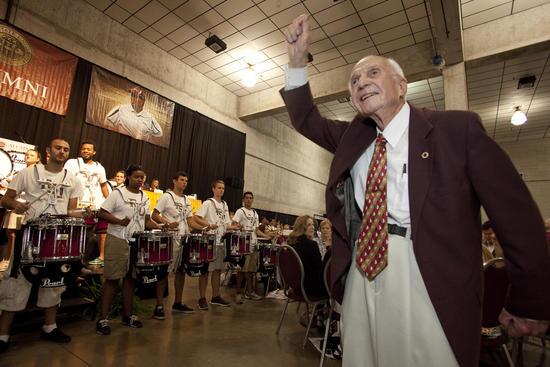When I attended FSU 1992-1994 for my Masters Degree in Arts Administration/Music Education/Voice I had no idea who Tommie Wright was.
When I first saw him, he was walking into the lecture hall at FSU, a 73 year old man with a slight hunch and a bit of a limp, to a classroom of 220 students, mainly male athletes who didn’t want to be in this music class, but needed the Arts credit. “They are going to eat him alive,” I naively thought to myself as I sat at the Teaching Assistant desk with a view of the lectern and front row. Within 60 seconds I knew I was totally wrong. At the time, I had no idea that Tommie was (and still is) a legend at FSU.
I was assigned to be Tommie’s Teaching Assistant for Music of Western Civilization for both years. I lovedddddd music history and musicology, and excelled in that field as an undergrad at Manhattanville College. So, when I was granted a full scholarship to FSU plus a teaching stipend, I was thrilled. I wasn’t a football fan, but FSU is a top music school and I figured I would fit in there, anyway. And, I became a huge football fan. It’s in the air in Tallahassee.
At the time, Tommie was still touring the country doing a George Gershwin piano show so he was absent from class about 50% of the time, which gave me ample time to teach the group of 220 students myself.
About 95% of the students in my classes were FSU football, baseball and basketball players. Some knew what they were getting into, others had no clue. Music History is NEVER an “easy class” to get an “easy credit.” Studying music history entails a ton of listening and analyzing classical music passages, understanding instruments and instrumentation, understanding the technology and known science at the time, and knowing social history as well as economics, politics, and generally what was going on in the world at the time.
Forrest Conoly, former Florida State University Seminole two-year starting offensive lineman, joined ESPN in 2012 as a college football analyst for ESPN3. He was in my class and once asked why we weren’t studying musicians like Dolly Parton. “Dude! This is the History of WESTERN music, NOT the History of Country Western Music,” I replied and 🤦♀️. He stood about 6’7” and weighed in at 320 pounds. When he stood at my desk, all I saw were knees.
Danny Kanell, at the time the quartback for the Seminoles, under Bobby Bowden, brought the team to National Champions while he was in my class. He was always in the last row to my left, first seat on the aisle, baseball cap over one eye, seemingly asleep yet pulled off A’s in every class. Nice boy, always polite, did what he was supposed to do. He went on to the Falcons, the Broncos, and the Giants before settling in here in Connecticut at ESPN.
Tommie was a legend, and beloved by those students. When I met with him for the first time, after that first class, I began to understand why.
Tommie had been at FSU teaching piano and music history since the 1940s- NINETEEN FORTIES. He arrived fresh from NBC studios, where he was the guy who played the organ live, as the actors acted out their scenes on live radio. Oh the stories he told were amazing! Old Hollywood, the start of tv shows- and he was right in the middle of the action.
Tommie wrote the FSU Fight Song in 1950, and it is still played at every game. That’s what he’s best known for, even to this day. He was also the nephew of the Wright Brothers, of flying fame. Tommie still had hints of his Carolina accent, and it was adorable.
In private, I’d listen to him tell me stories of his wife, who was about 35 years his junior, and their two children who were under 6 at the time! This man “had it all” at 70 something years old.
I would sometimes handle the details of his Gershwin gigs, which took him all over the country. What amazing concepts and marketing, that this man genius came up with – do an all Gershwin piano show acting as if he was an aged Gershwin, even though Gershwin had died in his 30’s. But what if he had lived? That was Tommie’s concept and it was genius.
What I learned most from Tommie the legend was How To Teach. He routinely had these large groups of students who couldn’t care less about music, in the palms of his hands. How? Through storytelling and bringing these legendary composers, that most music teachers put up on a pedestal, right down to earth as the humans, flawed and all, that they were. That became my teaching style from that point on, and 27 years later that is also how I coach and generally lead people – humility, humor, storytelling, simplicity, and always human.
Tommie died in 2014, at 95 years young.


